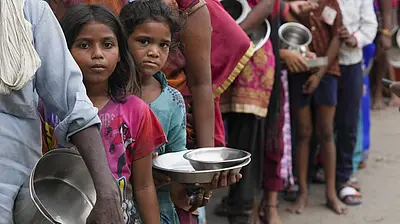KFC Shops Shut In Navratri: Is India Becoming A Country Where Personal Liberties Will Be Killed On The Pretext Of Religious Beliefs?

Imagine a warming capital where the scent of kebabs and spices is turned into a political battlefield. Welcome to Delhi, where your dinner plate has become the latest battlefield in the struggle between individual liberty and religious beliefs.
Recently, BJP MLA Ravinder Singh Negi has demanded the shutdown of meat shops during Navratri in Delhi. Another BJP MLA, Neeraj Basoya, has also made a similar demand. To counter the situation, AAP MP Sanjay Singh questioned why KFC shops and restaurants owned by BJP leaders remain open during Navratri and challenged the BJP to close these establishments if they truly cared about Hindu sentiments.
This can be called a loss-loss situation for the public, as the leaders are not concerned about their citizen’s personal liberties and are just bothered to keep their point at height!
This recent meat shop saga during Navratri is not so much about food but a chilling insight into the way unyielding religious beliefs continue to attack the basic rights of citizens of a so-called democratic republic.

Let’s look at this strange theatre show. A government minister, BJP MLA Ravinder Singh Negi, thinks meat shops near temples should close during Navratri. Why? Because he thinks it would be a bad idea to have a kebab shop nearby, as it might hurt the sentiments of some religious people. It’s like we should close down bookshops because someone might end up reading something against religious teachings. It’s actually disgusting.
The counterpoint is provided by AAP’s Sanjay Singh, who superbly brings out the hypocrisy with laser-like sarcasm. “KFC outlets and restaurants of BJP leaders are open; try shutting them if they have courage,” he says. And he’s not wrong. Why do some religious prohibitions apply only to select individuals and not to all? The double standards are so heavy you could use them as sandwich spread.
Historically, this is nothing new. Religious impositions are a control method for centuries now. Remember those medieval European sumptuary laws in which your attire and food intake relied entirely on your religious affiliations as well as on your social station? Or dietary restrictions that took place under one religious epoch in one culture or another? We’ve seen it before, and spoiler alert: it always turns out badly for personal freedom.
The most intriguing part of this whole circus is the pace at which individual discretion is run over by collective religious feeling. Another perfect example of this insidious mentality is a muslim cleric condemning Mohammad Shami for not fasting for Ramadan when he was playing cricket. When did religious observances become a compulsory uniform that every individual must wear, irrespective of his personal conditions or professional obligations?

What is most concerning is the rapidity with which these religious norms become the standard. One day it’s meat stores during Navratri, the next it might be dress codes, work restrictions, or even with whom you can converse. Oh, wait, it’s already there.
Recall when in March 2021, a panchayat in the Charthawal area of Muzaffarnagar, Uttar Pradesh, passed an order stating that boys should not wear half pants and girls should not wear jeans in villages, with the threat of social punishment for non-compliance. Or when in 2015, BJP’s Mahesh Sharma stoked another controversy by saying that girls wanting a night out is not acceptable in India, as it is not a part of our culture!
The slippery slope is very much real, and we are sliding down it very quickly. Our democracy is turning into a bizarre hybrid—a space where individual rights are constantly blurred against religious sentiments.
The declaration of Delhi Assembly Deputy Speaker Mohan Singh Bisht that “This is the country of Sanatan, and it should run accordingly” is probably the most upsetting aspect of this news story. It is a one-way concept of culture whereby differences are tolerated but not cherished, and individual decisions are lesser than collective religious values.
The harsh truth is “Are we so much of a democracy if a festival can dictate what you should eat, wear, or do?”
If a few people adopt a vegetarian diet during Navratri, does it mean the rest of us must follow what they impose?
The role of the government is to guard people’s rights, not play moral police and enforce religious diktats. Or we should consider that the responsibility of protecting people lies on their parents and not on the government, as said by Minister Vijay Shah of BJP in 2013?
The irony cuts deep—and not the kind these meat shop bureaucrats would be pleased about. While politicians gossip about the necessity of food choices on a religious holiday, genuine issues such as poverty, education, and healthcare are pushed aside.

We’re fighting over meat shops when basic human rights are at risk.
This has nothing to do with food. This is about the right to make decisions regarding your own life. This is about understanding in a genuine democratic society, your religion ends where my freedom begins. Each time we allow these little intrusions to occur, we chip away at the foundation of individual freedom.
So the next time someone tells you to shut down your butcher shop, feed them a plate of constitutional rights—extra spicy, just as democracy meant.
A rebellious plate can be the strongest way to resist.




